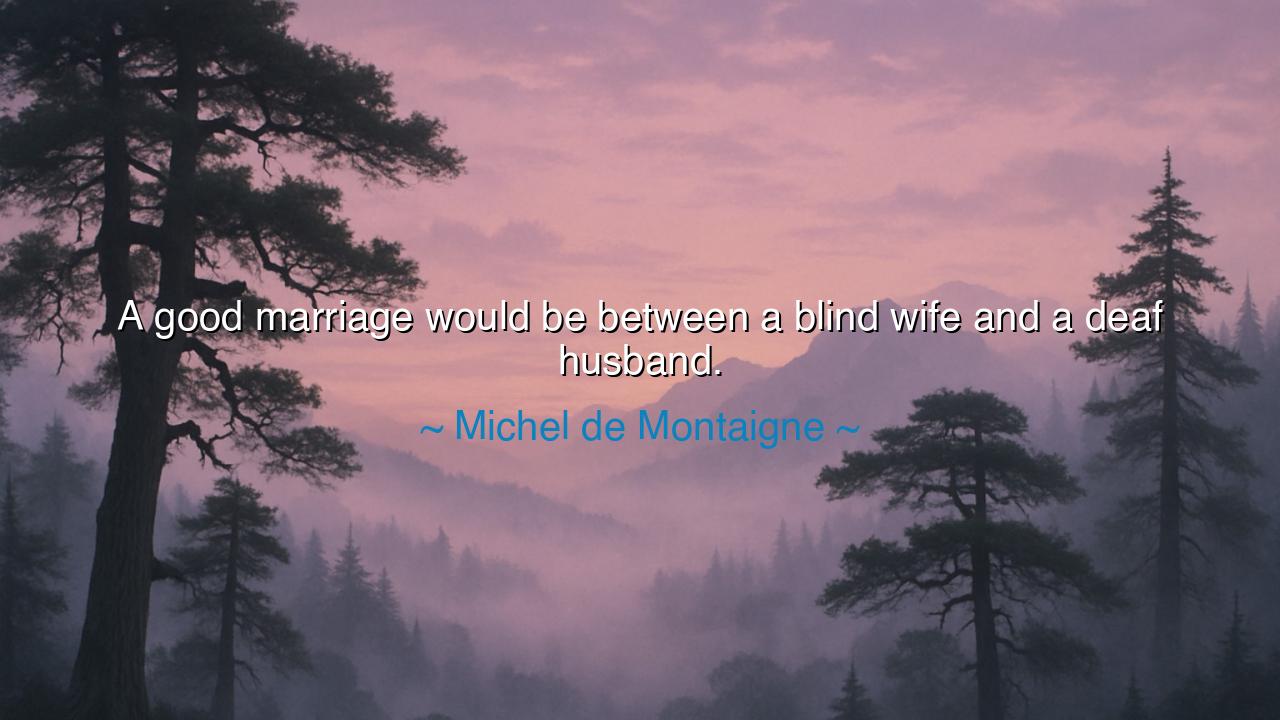
A good marriage would be between a blind wife and a deaf husband.






“A good marriage would be between a blind wife and a deaf husband.” Thus wrote Michel de Montaigne, the wise philosopher of France, who looked upon the follies of humankind with both tenderness and irony. Though his words sparkle with wit, beneath them lies a profound truth about love, tolerance, and endurance. For Montaigne did not speak of literal blindness or deafness, but of those sacred forms of forbearance—the ability to overlook faults, to ignore small offenses, to turn one’s senses not toward imperfection but toward peace. In his jest, he taught that a happy marriage is not born of perfect partners, but of those who see less, hear less, and love more.
In the age of Montaigne, marriage was not the romantic union of poets’ dreams but a practical bond—one bound by duty, reputation, and family honor. Yet Montaigne, who loved both reason and laughter, saw deeper. He understood that no partnership, however noble, can endure without the grace of imperfection accepted. To be “blind” as a wife, in his eyes, was to close one’s gaze to flaws, to refuse to dwell upon the minor irritations and disappointments that inevitably accompany shared life. To be “deaf” as a husband was to ignore the sharpness of words, to hear not every criticism, nor every sigh, but to listen instead to the deeper harmony beneath discord. Thus, through humor, Montaigne revealed the secret alchemy of marriage: the art of selective perception.
The ancients themselves would have nodded in agreement. For they too knew that peace in human union does not come through control, but through grace and restraint. A philosopher once said that love is a garden that flourishes only when the gardener pulls not every weed, lest he destroy the roots of beauty itself. So it is with marriage. If every fault is magnified, if every harsh word is met with its echo, the soil of love grows barren. But when one learns to overlook the small, when one’s heart grows gentle enough to forgive before being asked, the bond deepens beyond passion—it becomes companionship, steadfast and eternal.
Let us recall the story of Eleanor Roosevelt, whose marriage to President Franklin D. Roosevelt was one of both triumph and trial. She discovered her husband’s betrayal early in life, yet rather than destroy herself with bitterness, she chose to rise above it. She became not his mirror of resentment, but his partner in purpose. Though she saw and heard much that wounded her, she learned to turn her eyes toward his better nature and her ears toward the call of service and justice. In this, she embodied Montaigne’s wisdom: that to preserve what is noble, one must sometimes be blind to offense and deaf to pride. Their marriage, though imperfect, became one of the most powerful alliances in history—born not from unbroken bliss, but from unyielding understanding.
Montaigne’s wit, therefore, conceals a teaching far mightier than it first appears. It is a call to humility, to patience, to that quiet heroism which holds two souls together when storms arise. Every heart, no matter how loving, carries vanity, fear, and anger. And when two hearts meet, these flaws can clash like swords. But when one chooses silence over argument, or smiles instead of scorn, the battle is ended before it begins. A good marriage, then, is not the meeting of two perfect beings, but the agreement of two souls to forgive endlessly and to love quietly.
The wise among us know that peace in union is not built in the moments of joy, but in the moments of restraint. The blind wife, in Montaigne’s saying, does not fail to see—she chooses not to look. The deaf husband does not lack hearing—he chooses not to react. Together, they build a fortress of peace, not by denying truth, but by recognizing that love is greater than pride, that harmony is worth more than victory. This is not weakness, but the highest strength: the courage to let small things pass for the sake of something larger and eternal.
The lesson, my children, is this: to love truly is to see with mercy and to hear with grace. In every bond, there will be moments when the eyes wish to condemn and the ears wish to accuse. In those moments, remember Montaigne’s wisdom—close your eyes, turn your ear, and open your heart. For what matters most is not to be right, but to remain united. Let patience be your armor, humility your guide, and forgiveness your crown.
Thus, as the ancients taught and Montaigne reminded, marriage is not the joining of two perfect hearts, but the daily practice of overlooking imperfection in the name of love. Be, therefore, blind where sight would wound, and deaf where sound would divide. For in that blessed blindness and merciful silence lies the secret harmony that time itself cannot break—the quiet strength of two souls who, seeing less and loving more, have learned the true art of peace.






AAdministratorAdministrator
Welcome, honored guests. Please leave a comment, we will respond soon